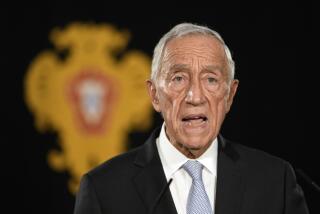Postwar Era of Coalition Rule Ends in Italy : Politics: President Scalfaro will seek a new premier to push for reforms demanded by voters.
- Share via
ROME — Surrendering to voter revolt against power-mongering political parties, Prime Minister Giuliano Amato formally resigned Thursday, ending Italy’s 51st postwar government and an era of weak, ineffectual coalition government.
Italian President Oscar Luigi Scalfaro accepted Amato’s resignation in the wake of a weekend referendum that ordered electoral reform, stripped state financing from political parties and abolished three government ministries.
Today, Scalfaro begins talks with party leaders in search of a new government leader able to steer voter-demanded electoral reforms through Parliament.
Analysts said Thursday night that it would probably be several days before Scalfaro chooses a prime minister-designate. In the meantime, Amato’s government remains as a caretaker.
Amato, a 54-year-old former economics professor who had headed a four-party coalition since last June, announced his intention to quit a government undermined by an unprecedented corruption scandal as soon as the referendum votes were in.
Now, the goal of all major parties is a general election this autumn in which a majority of seats in both the Senate and Chamber of Deputies would be won by the individuals who receive the most votes. Reform of the current system of proportional representation for three-quarters of the Senate’s 315 seats was mandated by the referendum.
What Parliament must do on its own is to extend the reform to the 630-seat lower house.
What voters overwhelmingly demand is a new electoral system that will reduce the power of political parties who have shared it among themselves for nearly half a century, creating in the process a vast network of corruption.
More than 2,600 Italians, many of them prominent politicians and business leaders, have been named in investigations into payoffs, kickbacks and bribes for public contracts.
In bidding farewell to Parliament on Thursday, Amato said he has no interest in succeeding himself, although some observers thought he would be the most suitable choice at the head of a broad-based, short-term government, possibly including members of Italy’s former Communist Party for the first time.
On the other hand, there was considerable pressure for Scalfaro to name an “institutional” government. In that case, he might turn to Chamber of Deputies Speaker Giorgio Napolitano, a former Communist, or Senate President Giovanni Spadolini, a member of the small Republican Party.
Mario Segni, a renegade Christian Democrat who was the prime mover behind the referendum, is also seen as a possible interim prime minister.
Whomever Scalfaro chooses, the new leader faces an acrimonious few months as the 14-party Parliament tries to legislate electoral reform bitterly opposed by small parties that have survived through proportional representation and now foresee their own demise.
More to Read
Sign up for Essential California
The most important California stories and recommendations in your inbox every morning.
You may occasionally receive promotional content from the Los Angeles Times.













